

Sufi Poets and Sufi Poetry. Sufism and the encounters that Sufism facilitates --encounters with God, love, and the deepest aspects of human consciousness-- have evoked feelings in Sufis that have poured out through their ravaged hearts onto their lucid tongues, providing us with some of the most beautiful and profound poetry ever written.
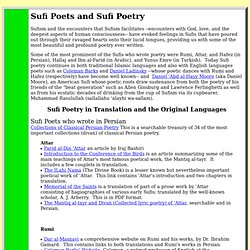
Sufi Poetry. Updated: 7-Apr-2014 A few poems from each of the following authors are included here as examples of the wondrous depth and variety of Sufi poetry: Attar Hafiz Jami Rumi Saadi Sanai Yunus Emry Shabistari Ansari Rabi'a Abil Kheir Sultan Bahu Ibn 'Arabi Baba Kuhi Mansur al-Hallaj Amir Khusrau Moinuddin Hasan Chishti Hazret-i Uftade Attar of Nishapur(1145 - 1221 ce) saint and mystic, one of the most voluminous authors in Persian literature on religious topics.
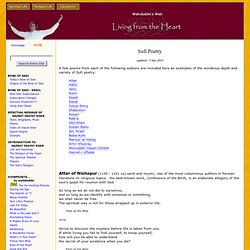
His best-known work, Conference of the Birds, is an elaborate allegory of the soul's quest for reunion with God So long as we do not die to ourselves, and so long as we identify with someone or something, we shall never be free. Farid al-Din Attar. (1145-1146 - c. 1221; Persian : ابو حمید ابن ابوبکر ابراهیم ), better known by his pen-names ( ) and ( - "the perfumer"), was a Persian Muslim poet, theoretician of Sufism , and hagiographer from Nīshāpūr who had an abiding influence on Persian poetry and Sufism . Biography Information about Attar's life is rare. He is mentioned by only two of his contemporaries, `Awfi and Tusi . However, all sources confirm that he was from Nishapur , a major city of medieval Khorasan (now located in the northeast of Iran ), and according to `Awfi, he was a poet of the Seljuq period .
It seems that he was not well known as a poet in his own lifetime, except at his home town, and his greatness as a mystic, a poet, and a master of narrative was not discovered until the 15th century. 1 `Attar was probably the son of a prosperous chemist, receiving an excellent education in various fields. Bibi Hayati Kermani. This search feature will enable you to find Muslim women alphabetically by their first names.

Many Muslim names have alternative spellings once rendered into English so if you cannot find the name you are looking for, please try the general search tab where you can enter keywords of your choice. This search feature will enable you to find Muslim women chronologically by the Common Era century. We are actively building the archive of Muslim women leaders from the past, as well as from today, and we would welcome your recommendations of women to feature. Please complete our “Recommend Muslim Women” form and check the site again in the near future as we actively expand this section of the portal with your suggestions. This search feature will enable you to find Muslim women by their Country. This search feature will enable you to find Muslim women leaders by entering the keyword(s) of your choice.
Bibi Hayati. Bibi Hayati was born in a province of Persia in what is now Iraq.
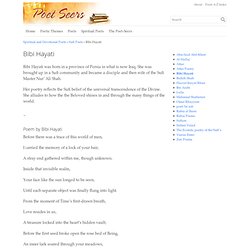
She was brought up in a Sufi community and became a disciple and then wife of the Sufi Master Nur’ Ali Shah. Her poetry reflects the Sufi belief of the universal transcendence of the Divine. She alludes to how the the Beloved shines in and through the many things of the world. Poem by Bibi Hayati. Mevlana Festival in KONYA(Turkey) Female Whirling Dervishes - Turkey. Mercan Dede, 'Dunya Festival Rotterdam' 25/05/2008. Sufism in Istanbul, Turkey. Rabia Basri. Rābiʻa al-ʻAdawiyya al-Qaysiyya (Arabic: رابعة العدوية القيسية) or simply Rābiʿah al-Baṣrī (Arabic: رابعة البصري) (717–801 C.E.) was a female Muslim saint and Sufi mystic[1] .
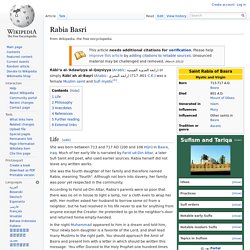
Life[edit] She was born between 713 and 717 AD (100 and 108 Hijri) in Basra, Iraq. Much of her early life is narrated by Farid ud-Din Attar, a later Sufi Saint and poet, who used earlier sources. Rabia herself did not leave any written works. She was the fourth daughter of her family and therefore named Rabia, meaning "fourth". According to Farid ud-Din Attar, Rabia's parents were so poor that there was no oil in house to light a lamp, nor a cloth even to wrap her with. In the night Muhammad appeared to him in a dream and told him, "Your newly born daughter is a favorite of the Lord, and shall lead many Muslims to the right path.
Rabia's father got up and went straight to the Amir with tears of joy rolling down his cheeks. She would pass the whole night in prayer, after she had finished her household jobs. "Lord! Rabia Al Basra-Female Sufi Sant Of Love, Courage And Dedication. {*style:<b>O Allah ! Rabia Basri. I have loved Thee with two loves, a selfish love and a love that is worthy (of Thee).
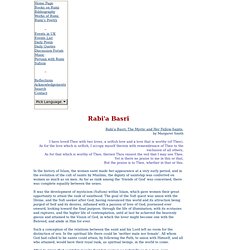
As for the love which is selfish, I occupy myself therein with remembrance of Thee to the exclusion of all others, As for that which is worthy of Thee, therien Thou raisest the veil that I may see Thee. Yet is there no praise to me in this or that, But the praise is to Thee, whether in that or this. Rabia al Basri - All poems of Rabia al Basri. Yunus Emre. Yunus Emre (Turkish pronunciation: [juˈnus emˈɾe]) (1240? –1321?) Was a Turkish poet and Sufi mystic. He has exercised immense influence on Turkish literature, from his own day until the present. Because Yunus Emre is, after Ahmet Yesevi and Sultan Walad, one of the first known poets to have composed works in the spoken Turkish of his own age and region rather than in Persian or Arabic, his diction remains very close to the popular speech of his contemporaries in Central and Western Anatolia. This is also the language of a number of anonymous folk-poets, folk-songs, fairy tales, riddles (tekerlemeler), and proverbs.
Yunus Emre's portrait is depicted on the reverse of the Turkish 200 lira banknote issued in 2009.[4] Reverse of the 200 lira banknote (2009) External links[edit] References[edit] Jump up ^ Edouard Roditi. Muhyiddin Ibn 'Arabi 1165AD - 1240AD and the Ibn 'Arabi Society. When My Beloved Appears. EL-GHAZALI. THE twelfth-century philosopher and Sufi El-Ghazali quotes in his Book of Knowledge this line from El-Mutanabbi: 'To the sick man, sweet water tastes bitter in the mouth.' This could very well be taken as Ghazali's motto.
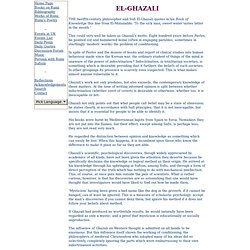
Mevlana Celaddiin-i Rumi, 13th century Muslim saint and Anatolian mystic. Virtual Tour of Mevlana Museum / Mevlana Müzesi Sanal Tur Uygulaması / 2007. Mowlana, Poet of Life’s Dance. Compiled By: Firouzeh Mirrazavi, Deputy Editor of Iran Review Each year on December a religious celebration is held at the site of Rumi’s tomb, to which tens of thousands of pilgrims come.
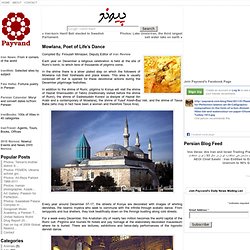
In the shrine there is a silver plated step on which the followers of Mowlana rub their foreheads and place kisses. This area is usually cordoned off but is opened for these devotional actions during the December pilgrimage festivities. Interview: 'Many Americans Love Rumi...But They Prefer He Not Be Muslim' Source: RFE/RL.

Rumi Ruminations - Wisdom of Rumi. MEVLANA CELALEDDIN-I RUMI: DANCE OF LOVE - TRAILER. Mevlana Celaleddin-i Rumi: Aşkın Dansı (Rumi - The Dance of Love) Rumi: Say I Am You (Sufi poem) MERCAN DEDE. The Mevlana Rumi derwishes of Damascus. Afghanistan Hakim Sanai. Afghanland.com: Hakim Sana’i was one of the most significant poets in the history of Islamic mysticism.
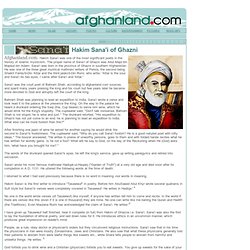
The proper name of Sana’i of Ghazni was Abul Majd bin Majdud bin Adam. Sana’i was born in the province of Ghazni in southern Afghanistan. He was one of the three great mystical mathnavi writers of Persia, the second being Shaikh Faridu'd-Din 'Attar and the third jalalu'd-Din Rumi, who write; “Attar is the soul and Sana’i its two eyes, I came after Sana’i and 'Attar.” Sana’i was the court poet of Bahram Shah, according to afghanland.com sources, and spent many years praising the king and his court but few years later he became more devoted to God and abruptly left the court of the king.
Bahram Shah was planning to lead an expedition to India, Sana’i wrote a verse and took read it to the palace at the presence the King. After finishing one jaam of wine he asked for another saying he would drink the second to Sana’i's foolishness.